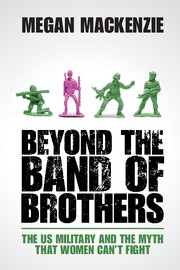Book contents
- Frontmatter
- Dedication
- Contents
- List of tables
- Acknowledgments
- Introduction: myths, men, and policy making
- 1 The combat exclusion is a story we tell ourselves … about men
- 2 The disintegration of the combat exclusion in Iraq and Afghanistan
- 3 It just doesn't feel right: emotion and the combat exclusion policy
- 4 Faster, stronger, more male: women and the failure of physical standards
- 5 Sex, cohesion, and national security
- 6 Using online debates to map public reaction to the combat exclusion
- Conclusion
- Bibliography
- Index
6 - Using online debates to map public reaction to the combat exclusion
Published online by Cambridge University Press: 05 July 2015
- Frontmatter
- Dedication
- Contents
- List of tables
- Acknowledgments
- Introduction: myths, men, and policy making
- 1 The combat exclusion is a story we tell ourselves … about men
- 2 The disintegration of the combat exclusion in Iraq and Afghanistan
- 3 It just doesn't feel right: emotion and the combat exclusion policy
- 4 Faster, stronger, more male: women and the failure of physical standards
- 5 Sex, cohesion, and national security
- 6 Using online debates to map public reaction to the combat exclusion
- Conclusion
- Bibliography
- Index
Summary
One key objective of this book is to understand how myths and stereotypes shape debates on the combat exclusion. The previous chapters have largely relied on media articles, opinion pieces, public opinion polls, and public policy debates. Although these resources are useful, they provide a limited window into wider public opinions on the combat exclusion. Polls merely assess individual responses to set questions, leaving no room for the public to frame the issue in their own terms. For example, although a poll might indicate that 60 percent of Americans were in favor of removing the combat exclusion, it tells us little about what reasons they have for supporting or opposing the policy change. As a result, it is worthwhile to draw from more diverse sources of public discourse for a richer understanding of public opinions on women and combat.
This chapter provides an analysis of online comments written in response to three online articles on the combat exclusion for women. It addresses three central questions. How can we analyze online discussions and use them as a source of discourse? What are the dominant reasons users commenting in these discussions offer with regard to their support or opposition to the combat exclusion? Do these reasons reflect the themes in the literature, and do they relate to the band of brothers myth? In answering these questions, this chapter has three objectives. The first is to present a methodology for analyzing a vast quantity of online comments. The second is to determine the main arguments online contributors offered in support or opposition to the combat exclusion and assess whether these reasons reflect official political discourse on the topic. The third is to consider whether tropes, messages, and narratives linked to the band of brothers myth are evident in online discussions related to women in combat.
Online mediums are often perceived as attracting unrepresentative contributors and exchanges and therefore are treated as if they do not provide an accurate picture of political discourse.
- Type
- Chapter
- Information
- Beyond the Band of BrothersThe US Military and the Myth that Women Can't Fight, pp. 155 - 193Publisher: Cambridge University PressPrint publication year: 2015



